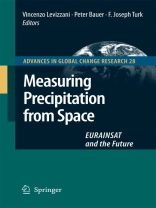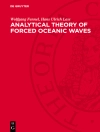Measuring Precipitation from Space presents state-of-the-art rainfall estimation algorithms, validation strategies, precipitation modelling, and assimilation in numerical weather prediction models. Clouds and precipitation observations and modelling are addressed for the improvement of the rainfall product quality. Special attention is given to the applications to monitoring and forecasting weather events and to climate monitoring in a frame of growing public interest.
No other book can offer to scientists, Ph.D. or equivalent students, professionals in environmental disciplines, and decision makers such a powerful tool to understand the basics of remote sensing for precipitation, to make use of existing products and to have a glimpse of the near future missions and instruments.
Other categories of readers will find in the book reference material for their questions on weather and climate applications. The essays are written by the most qualified experts in the field of passive and active remote sensing, cloud and mesoscale modelling, validation and space mission planning. Top academic and research institutions and space agencies have concurred to the first joint effort ever.
Cuprins
Climate Monitoring.- European Commission Research for Global Climate Change Studies: Towards Improved Water Observations and Forecasting Capability.- Is Man Actively Changing the Environment.- The Global Precipitation Climatology Project.- Oceanic Precipitation Variability and the North Atlantic Oscillation.- Global Satellite Datasets: Data Availability for Scientists and Operational Users.- Cloud Studies in Support of Satellite Rainfall Measurements.- Cloud Top Microphysics as a Tool for Precipitation Measurements.- The Retrieval of Cloud Top Properties Using VIS-IR Channels.- Cloud Microphysical Properties Retrieval During Intense Biomass Burning Events Over Africa and Portugal.- 3D Effects in Microwave Radiative Transport Inside Precipitating Clouds: Modeling and Applications.- Cloud Microphysical Properties from Remote Sensing of Lightning within the Mediterranean.- The Worth of Long-Range Lightning Observations on Overland Satellite Rainfall Estimation.- Neural Network tools for Satellite Rainfall Estimation.- Rainfall Algorithms.- Passive Microwave Precipitation Measurements at Mid- and High Latitudes.- The Goddard Profiling Algorithm (GPROF): Description and Current Applications.- Past, Present and Future of Microwave Operational Rainfall Algorithms.- Space-Borne Radar Algorithms.- Rain Type Classification Algorithm.- Dual-Wavelength Radar Algorithm.- A Next-generation Microwave Rainfall Retrieval Algorithm for use by TRMM and GPM.- Blended Techniques.- The University of Birmingham Global Rainfall Algorithms.- Multivariate Probability Matching for Microwave Infrared Combined Rainfall Algorithm (MICRA).- Toward Improvements in Short-time Scale Satellite-Derived Precipitation Estimates using Blended Satellite Techniques.- Global Rainfall Analyses at Monthly and 3-h Time Scales.- CPC MORPHING Technique (CMORPH).- CMAP: The CPC Merged Analysis of Precipitation.- Rainfall Estimation Using a Cloud Patch Classification Map.- Validating Satellite Rainfall Measurements.- Methods for Verifying Satellite Precipitation Estimates.- Assessment of Satellite Rain Retrieval Error Propagation in the Prediction of Land Surface Hydrologi.- EURAINSAT Algorithm Validation and Intercomparison Exercise.- Ground Validation for the Global Precipitation Climatology Project.- Validation of Rainfall Algorithms at the NOAA Climate Prediction Center.- Ground Networks: Are We Doing the Right Thing?.- Modeling Precipitation Processes and Data Assimilation for Nwp.- Aerosol Impact on Precipitation from Convective Clouds.- The Wisconsin Dynamic/Microphysical Model (WISCDYMM) and the use of it to Interpret Satellite-Observed Storm Dynamics.- The European Centre for Medium-Range Weather Forecasts Global Rainfall Data Assimilation Experimentation.- Rainfall Assimilation into Limited Area Models.- Implementing an Operational Chain: The Florence La MMA Laboratory.- Applications to Monitoring Weather Events.- Satellite Precipitation Algorithms for Extreme Precipitation Events.- Application of a Blended MW-IR Rainfall Algorithm to the Mediterranean.- Retrieving Precipitation with GOES, Meteosat, and Terra/MSG at the Tropics and Mid-latitudes.- Model and Satellite Analysis of the November 9–10, 2001 Algeria Flood.- Modeling Microphysical Signatures of Extreme Events in the Western Mediterranean to Provide a Basis for Diagnosing Precipitation from Space.- Online Visualization and Analysis: A New Avenue to use Satellite Data for Weather, Climate, and Interdisciplinary Research and Applications.- The Present and Future of Satellite Platforms.- The Space-Based Component ofthe World Weather Watch’s Global Observing System (GOS).- The Meteosat and EPS/Metop Satellite Series.- The Evolution of the NOAA Satellite Platforms.- Japan’s Role in the Present and Future Satellite Observation for Global Water Cycle Research.- International Global Precipitation Measurement (GPM) Program and Mission: An Overview.- Snowfall Measurements by Proposed European GPM Mission.- Observing Rain by Millimetre–Submillimetre Wave Sounding from Geostationary Orbit.- The CGMS/WMO Virtual Laboratory for Education and Training in Satellite Matters.- The International Precipitation Working Group: A Bridge Towards Operational Applications.












